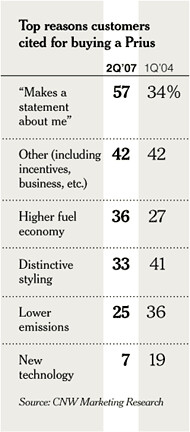"The exciting benefits of electric vehicles"...

New York Times graphic.
The basic position of this blog is to promote sustainable transportation--walking, biking, and transit, complemented by car sharing and occasional renting--first and foremost, rather than car ownership. ... not unlike how nutritionists recommend for health reasons that meat no longer be treated as the "main course" with a huge portion, but as a small portion complemented by vegetables and grains.
1. But it's very difficult for such vehicles, especially electric-only, to compete financially with gasoline, even at higher prices, because of the higher purchase price due to the cost and complexity of batteries. For a commercial vehicle, gasoline has to be between $6-$8/gallon for an electric vehicle to be cost-competitive, based on an e-conversation I had with one company.
And two weeks ago, the company that does the electric version of the Ford Transit Connect light truck stopped production and filed for bankruptcy. Although this was more a function of financing and losses, not problems with the vehicle. See "Ford Transit Connect Electric Drivetrain Manufacturer Files for Bankruptcy" from Motor Trend Magazine.
2. From the Sierra Club:
Watch Parties: Revenge of the Electric Car documentary
The Sierra Club is holding nationwide house parties for the new film "Revenge of the Electric Car" April 12-18. In the week leading up to Earth Day, this will be a great way to learn about the exciting benefits of electric vehicles.
If you are not able to host or attend a "Revenge" Sierra Club house party between April 12 and 18, we encourage you to see it either streaming live on Netflix anytime or on public television, where it will be shown on April 19 at 10 p.m. in most areas (but check your local listings).
-- Revenge of the Electric Car documentary website
3. The Auto-lib electric car sharing program in Paris has had some issues. See "Parisian Autolib car sharing service suffers setbacks, sells 6000 subscriptions" from the Autoblog.
4. Interestingly, the Los Angeles Times reports, in "Many hybrid-car owners buy once -- but not again, Polk study says," on an R.L. Polk finding that hybrid vehicle purchasers are less likely to purchase another hybrid vehicle, Although this could be a function of their relative new-ness on the market, part of the issue is likely the fact that it takes a long time--longer than most people own a vehicle--for the increased purchase cost to pay out in reduced operating costs.
Also see the report from Topline Strategy Group, Why People Really Buy Hybrids.
Labels: car culture and automobility, green-environment-urban, transportation planning



1 Comments:
Much obliged to you for giving such essential data, and a debt of gratitude is for sharing this issue.
Post a Comment
<< Home